Table of Contents
You don’t need to be rich to start something of your own. ₹10 lakh is more than enough, if you use it wisely. Plenty of small businesses start out with even less.
Think food, local services, or online work. These are businesses that don’t need big offices or fancy gear. Just basic tools, consistency, and a bit of street smarts.
This guide isn’t theory. It’s a breakdown of practical ideas, grouped by type, with rough costs and simple advice. You’ll find things you can start from home, from your kitchen, or even with just your phone.
If you’ve been waiting for the “right time,” this is it. Start small, stay steady, and build something that lasts.
Food & Wellness Businesses
People always spend on food and health even when they cut back elsewhere. If you can cook, teach, or just run things well, you can start something solid here without blowing your budget. You don’t need a full restaurant or gym. A single room and consistent service go a long way.
Cloud Kitchen
Skip the dine-in stress. Cook, pack, and deliver; that’s it. Pick a small kitchen, register with FSSAI, and get on food delivery apps. Keep your menu short. Focus on food that travels well: parathas, rice bowls, homestyle meals.
You’ll need a good stove, fridge, utensils, containers, and a helper. Rent takes a bite, but you don’t need more than ₹7–₹8 lakh to get started.
Get local orders through WhatsApp too, don’t rely only on apps.
Pickles & Condiments
Homemade pickles, chutneys, spice mixes people love them if they’re clean, well-packed, and taste like something their grandmother might’ve made.
You can start from your own kitchen. You’ll need jars, a sealing machine, labels, and a food licence. Costs stay low, ₹4 lakh is enough.
Start with 2–3 items. Sell to shops, on Instagram, or at weekend pop-ups. Keep batches small and quality tight.
Yoga or Wellness Coaching
If you’re certified, great. If not, it’s worth getting trained. Yoga, fitness, or even guided meditation, there’s demand in every city.
You don’t need a studio. Use your living room or go to clients. Get a few mats, speakers, and basic props. Setup costs under ₹5 lakh.
Run morning and evening batches. Offer one free trial class. Once people settle in, they rarely switch instructors.
These aren’t overnight wins. But if you’re steady, word spreads. One apartment complex can bring you months of work and a full calendar.
Eco & Handmade Products
People are done with plastic junk. They want things that feel personal; reusable, handmade, or at least built with care. If you’re the kind who enjoys crafting or sourcing local materials, this space gives you a lot to work with. Low investment, high demand, and decent margins if you keep quality tight.
Jute Bags
With single-use plastic on its way out, jute bags are picking up fast. Grocery stores, gift shops, and even small events want reusable bags with some character.
A few sewing machines, jute rolls, threads, and a cutting table get you started. You can manage with ₹5–₹6 lakh, even less if you already have the space.
The money’s not in plain bags, it’s in custom prints and bulk orders. Start small. Offer samples to local stores. Don’t overstock.
Handmade Soaps or Candles
People love buying things that smell good and look nice. Soap and candle kits are affordable, and you can start from your kitchen.
You’ll need a melting pot, moulds, wax or oils, colours, scents, and decent packaging. All in, ₹3–₹4 lakh is enough.
Sell in small boxes: Diwali hampers, wedding favours, return gifts. Post behind-the-scenes videos. Customers like seeing the hands that made the product.
Agarbatti (Incense Sticks)
Still a steady seller — temples, homes, spas. Start with a semi-auto machine (₹1–₹1.5 lakh), bamboo sticks, perfumed powder, and basic packaging.
Drying takes time, so you need a clean, ventilated space. Keep your scents simple at first: sandalwood, rose, jasmine.
Costs stay under ₹5 lakh. Sell locally at first. Once people like your fragrance, word spreads fast.
Handmade businesses grow slower, but they grow deep. People buy again, not just for the product, but for the feeling it gives them. That’s hard to replace.
Home & Local Services
You don’t need a fancy shop to earn well. In fact, some of the most dependable small businesses are run from homes, scooters, or the back of a van. These ideas solve everyday problems, laundry, grooming, repairs, and they grow fast through local referrals.
Mobile Laundry
Working folks don’t have time for handwashing or chasing iron-walas. Offer pickup and delivery laundry with a single washer, dryer, and a van.
You’ll spend ₹6–₹7 lakh to set up. Start with a few buildings. Give first-time offers. Once people trust your timing, they won’t switch.
Car Wash at Home
All you need is a water tank, a pressure gun, soap, and a portable vacuum. It fits in a hatchback. ₹3–₹4 lakh covers everything.
Target apartments on weekends. Book multiple cars in one spot to save time and fuel. Offer add-ons like interior cleaning for a bit more.
Pet Grooming
Pet owners want clean dogs — without clogging their own bathrooms. A foldable table, clippers, blower, and some herbal shampoo gets you started.
₹4 lakh is enough to buy gear and take a short grooming course. Set up in housing societies on weekends or go home-to-home on weekdays.
Tailoring & Alterations
There’s always work for someone who can fix zippers, shorten sleeves, or stitch simple blouses. Start from home with one machine, a mirror, and a cutting table.
You’ll need under ₹2.5 lakh. Keep it clean, well-lit, and professional. Use local WhatsApp groups to spread the word.
These businesses don’t need billboards. They grow when people say, “This person does good work. Call them.” Do the job right, be on time, and you won’t need to look for customers — they’ll find you.
Digital & Remote Work
You don’t need a shop to start a business anymore. These days, a lot of people are working straight out of their bedrooms — just a laptop, phone, and a skill they can sell. Setup costs are low. No rent, no staff, no headache. If you’re willing to hustle and stay consistent, these ideas actually work.
Freelance Design
If you’re decent with design tools and have a good eye, there’s steady work out there. Start by doing a few jobs for people you know — a café menu, a wedding invite, maybe a logo. Post your work online, even if it’s just on Instagram.
You’ll need a solid laptop, some design software, and decent internet. Budget: ₹2–₹3 lakh, tops. The real challenge is getting your first few clients — after that, it gets easier.
Resume Fixing & Career Help
Everyone’s looking for jobs, but very few people know how to write about themselves. If you’re good with words, you can help. Fix their résumés, rewrite bios, prep them for interviews.
You don’t need much: a basic website, a Zoom account, and a few samples. Offer tiered pricing. Start with friends, ask them to refer others. You can set this up for under ₹2 lakh.
Teaching Online
If you know something useful, Excel, spoken English, even baking, you can teach it. Record short lessons, upload them, and let people learn at their own pace.
₹3–₹4 lakh covers your phone, mic, lighting, and a platform to host your course. Keep videos simple. People care more about clear lessons than fancy editing. Start with free sessions. Ask for feedback. Improve.
One-Product Store
Find one thing that sells, not ten. Could be a posture belt, a diary, a kitchen tool. Buy in bulk or dropship. Set up a basic website, click good photos, and test small ads.
₹4–₹5 lakh is enough. If it works, scale. If it doesn’t, switch the product and go again.
You don’t need to be an expert. Just stay consistent, learn as you go, and show up every day. That’s what keeps digital businesses alive.
Trading & Reselling
You don’t have to manufacture anything to run a business. If you know how to find good products and better buyers, trading can be a solid play. The key is to move fast, know your margins, and avoid getting stuck with dead stock.
Steel Scrap & Hardware Reselling
Steel is always moving in India; whether it’s for buildings, workshops, or small fabrication jobs. You don’t need to run a mill to get in on it. With about ₹5–10 lakh, you can set up as a reseller, focusing on scrap steel or common hardware like rods, sheets, angles, or fasteners.
The entry point is building contacts. Local workshops, fabrication units, and small contractors often need steady supply but don’t have the bandwidth to deal directly with big distributors. If you can source material in smaller lots and deliver it quickly, you’ll always have buyers.
Margins in steel are thin, but volumes make up for it. Work on-demand instead of piling up stock, it keeps your cash free and reduces risk. A small godown or even a rented shed is enough for storage. Offer local delivery within a fixed radius, and you’ll stand out against bigger suppliers who don’t bother with smaller orders.
Tip: Keep a basic record of weights, grades, and prices updated daily. In this trade, trust comes from accuracy, if your numbers are off, customers won’t come back.
Gift Hampers
People love neat, ready-made gift boxes. During festivals, weddings, baby showers; there’s always demand. You don’t need a factory. Just a few bulk suppliers, solid packaging, and a knack for putting things together that feel personal.
Spend ₹3–₹5 lakh on sample stock, cartons, ribbons, and branding. Sell to housing societies, small companies, or through Instagram. Focus on custom orders — they pay better.
Secondhand Clothing Resale
Thrift is in. Branded jackets, old denim, barely-worn dresses, all of it sells if you present it well. Visit export surplus shops, pick what looks good, steam and shoot it properly.
Upload to a simple website or even just a social page. Keep drops limited. ₹2–₹3 lakh is enough to get going. You’re not selling used clothes, you’re curating cool ones.
Niche Product Import
Find a small item people want but can’t easily buy here, maybe a car gadget, LED light strip, or pet accessory. Source it from a reliable overseas supplier, ship in small lots, and sell online.
Use IndiaMART or Facebook groups to reach buyers. Don’t order in bulk until something actually moves. Setup: ₹5–₹6 lakh if you include import duty and trial runs.
Bulk Stationery Trade
Schools and small offices need stationery in bulk — and fast. Partner with a manufacturer, print the school logo, and deliver neatly packed sets before term starts.
You’ll need ₹3–₹4 lakh to pay for stock, basic branding, and delivery. Go class by class. Keep it simple, organised, and on time.
Trading is about timing, not luck. Watch what moves, stay lean, and always know your numbers. And remember; one loyal buyer is worth more than a hundred maybes.
How MSMEs Can Get Started
An idea is just the first step. To turn it into a working business, you need to set a proper base. For small ventures in India, that means paperwork, money, and a system that can grow with time. Here’s how to start:
1. Get registered
Every MSME should begin with Udyam. It’s simple, free, and gives you a certificate that proves you exist in the system. Without it, banks and schemes will treat you like an informal trader.
2. Pick a structure you can manage
Most new entrepreneurs begin as sole proprietors because it’s easy to set up. You can switch to a partnership or private limited later. Don’t get stuck debating paperwork when the real job is finding customers.
3. Cover the licences
Food businesses need FSSAI. Shops and services may require a local Shop & Establishment licence. If your turnover crosses the GST threshold, register early. These aren’t just rules — customers and vendors will take you more seriously when you’re compliant.
4. Plan your finance
For businesses under ₹10 lakh, schemes like Mudra, PMEGP, and CGTMSE are useful. Banks will want to see your Udyam certificate, a basic project plan, and proof you can repay. Walk in with documents ready, it saves weeks of delay.
5. Start lean, then build
Don’t spend the whole ₹10 lakh at once. Test a small batch, deliver it, learn from mistakes, and slowly reinvest. Most MSMEs that last didn’t explode in year one; they survived because they grew steadily.
Conclusion
Starting small isn’t a weakness; it’s how most real businesses begin. ₹10 lakh might not seem like much, but if you use it right, it’s more than enough. You don’t need to chase trends or build something perfect on day one. Just pick a lane, keep things simple, and get moving.
Most of the ideas we’ve shared don’t need a big shop or a full-time team. They need steady work, clean delivery, and a bit of patience. Some weeks will be quiet. Others might surprise you. What matters is you stay in the game long enough to learn what works.
Don’t wait for the “ideal moment.” You’ll always find a reason to delay. Start small, stay consistent, and listen to your customers; they’ll tell you what needs fixing. And when something goes wrong (because it will), fix it quick and move on.
Your first few orders might come from friends. That’s fine. What matters is that the work starts. From there, it’s yours to build; slowly, honestly, and in your own way.
Empowering MSMEs to grow smarter
Tata nexarc delivers powerful solutions for MSMEs—discover tenders, logistics solutions, and streamline procurement. Everything your business needs, all in one place.
FAQs
What documents are needed to apply for a Mudra loan?
Can I run an MSME from home without a shop licence?
How long does Udyam registration take?
What is the repayment period for PMEGP loans?
Do small food businesses need GST if they’re under ₹20 lakh turnover?
Can I get subsidies for buying machines under MSME schemes?
Yes, several schemes provide subsidies for machinery, especially under PMEGP and state-level programs.
What insurance should MSMEs consider?
Are digital marketing costs eligible under MSME loans?
Yes, banks allow part of the loan to cover branding, websites, and digital promotion.
Can a student or homemaker register an MSME?
What common mistakes do new MSMEs make?
Priyanka is a seasoned content marketing professional with more than 6 years of experience crafting various forms of business and technology sector content. Her insightful writing tackles critical issues faced by small-scale manufacturing businesses. Priyanka's clear and concise communication empowers businesses to make informed decisions and thrive in today's dynamic business environment.
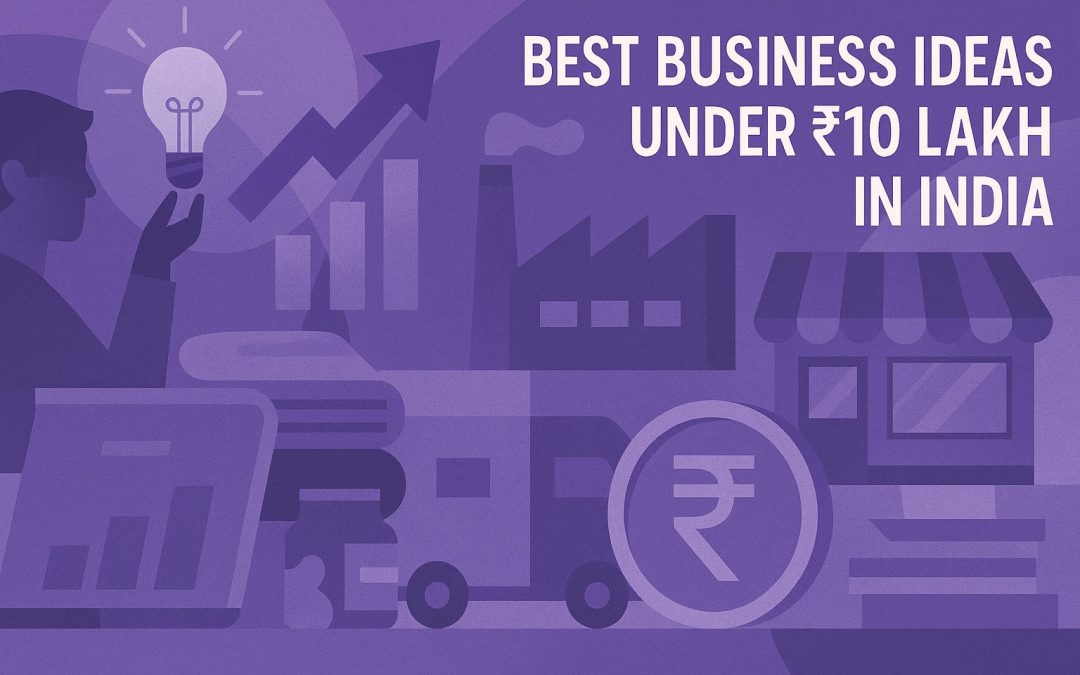


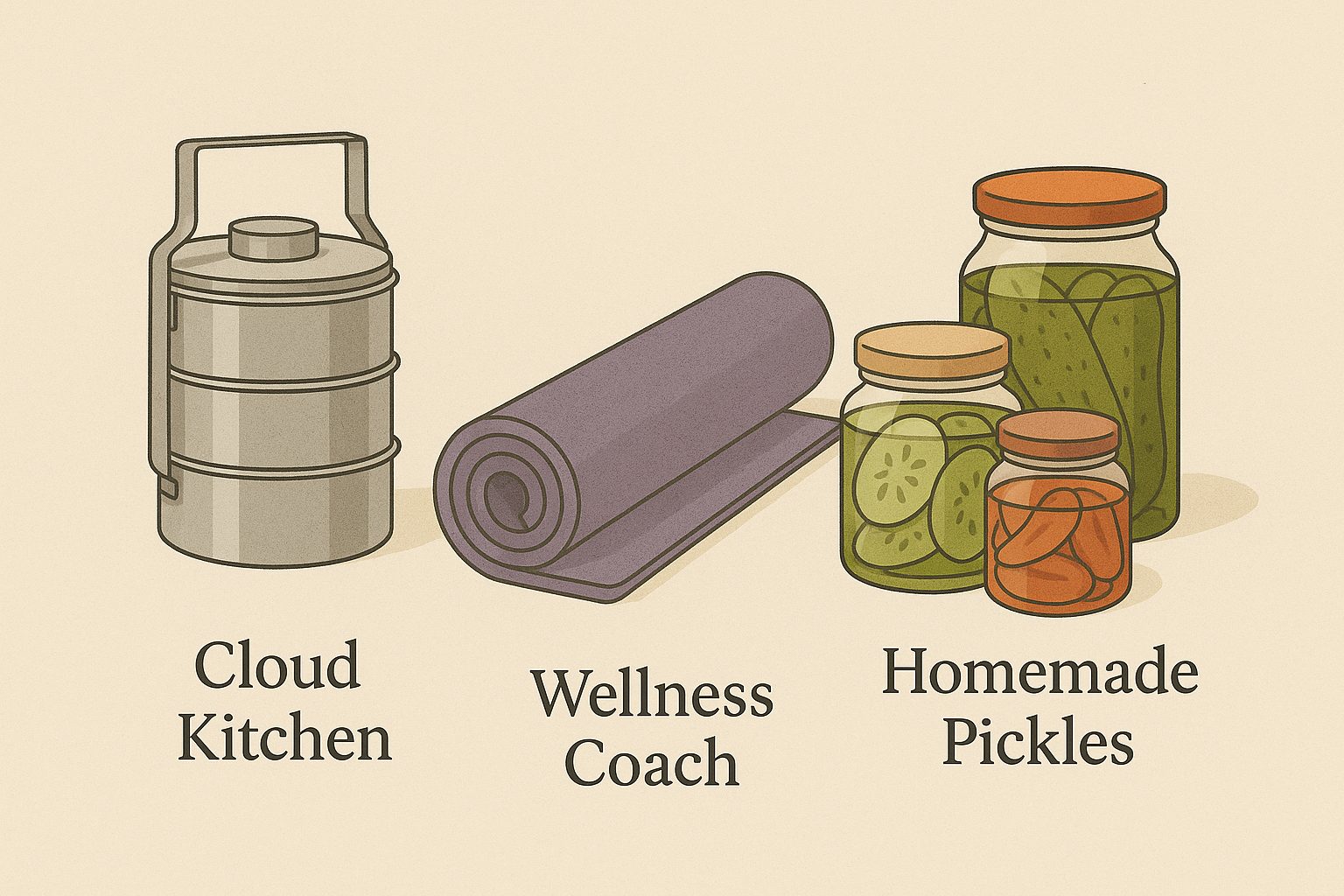
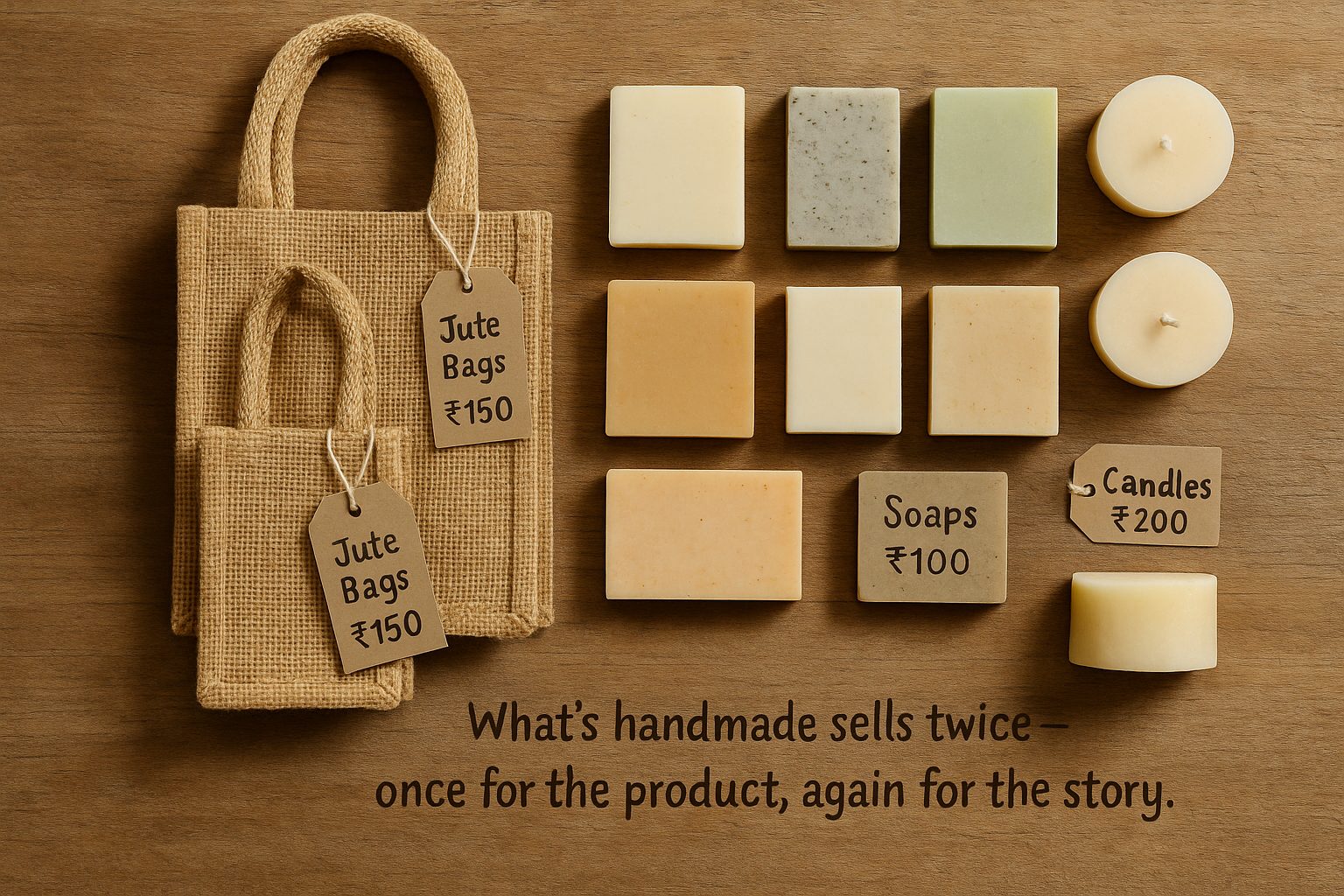
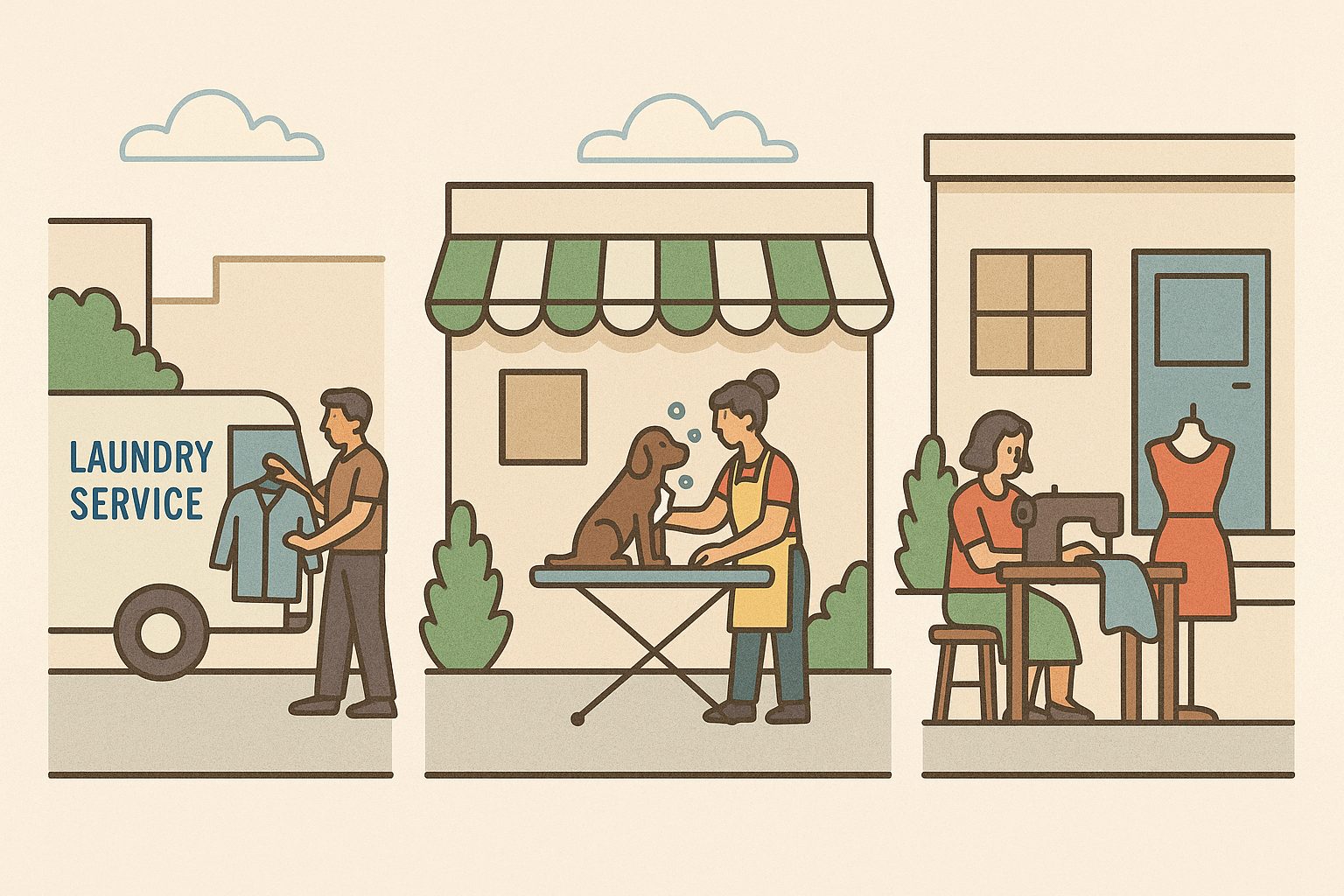

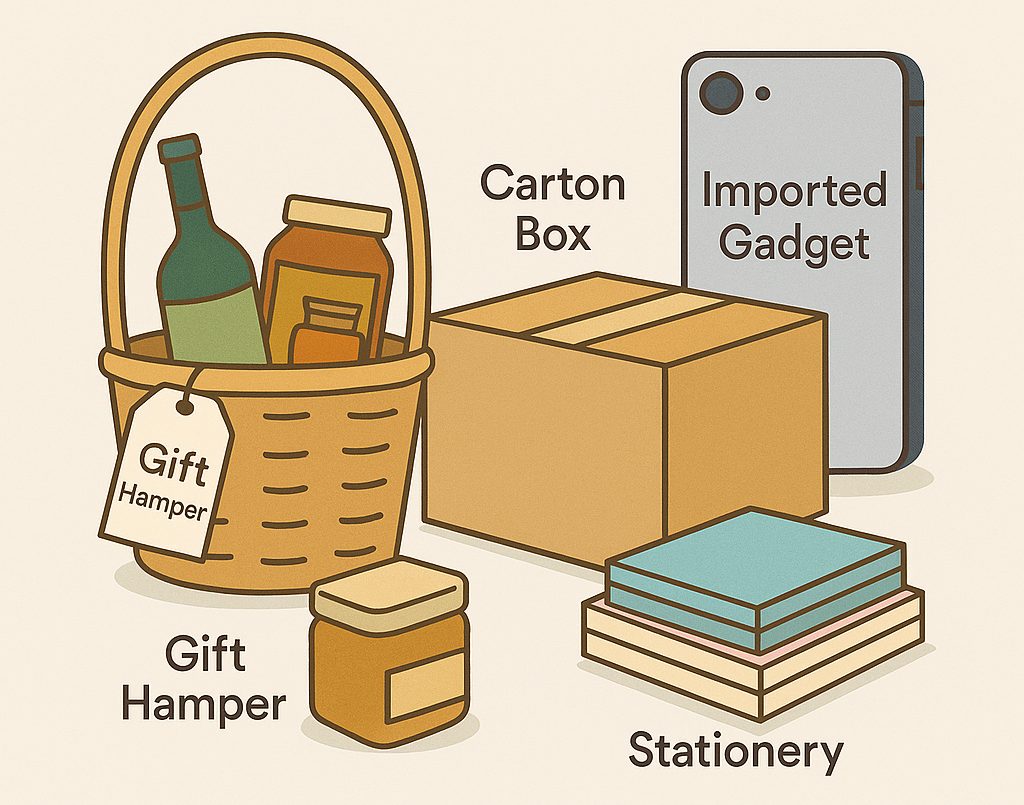
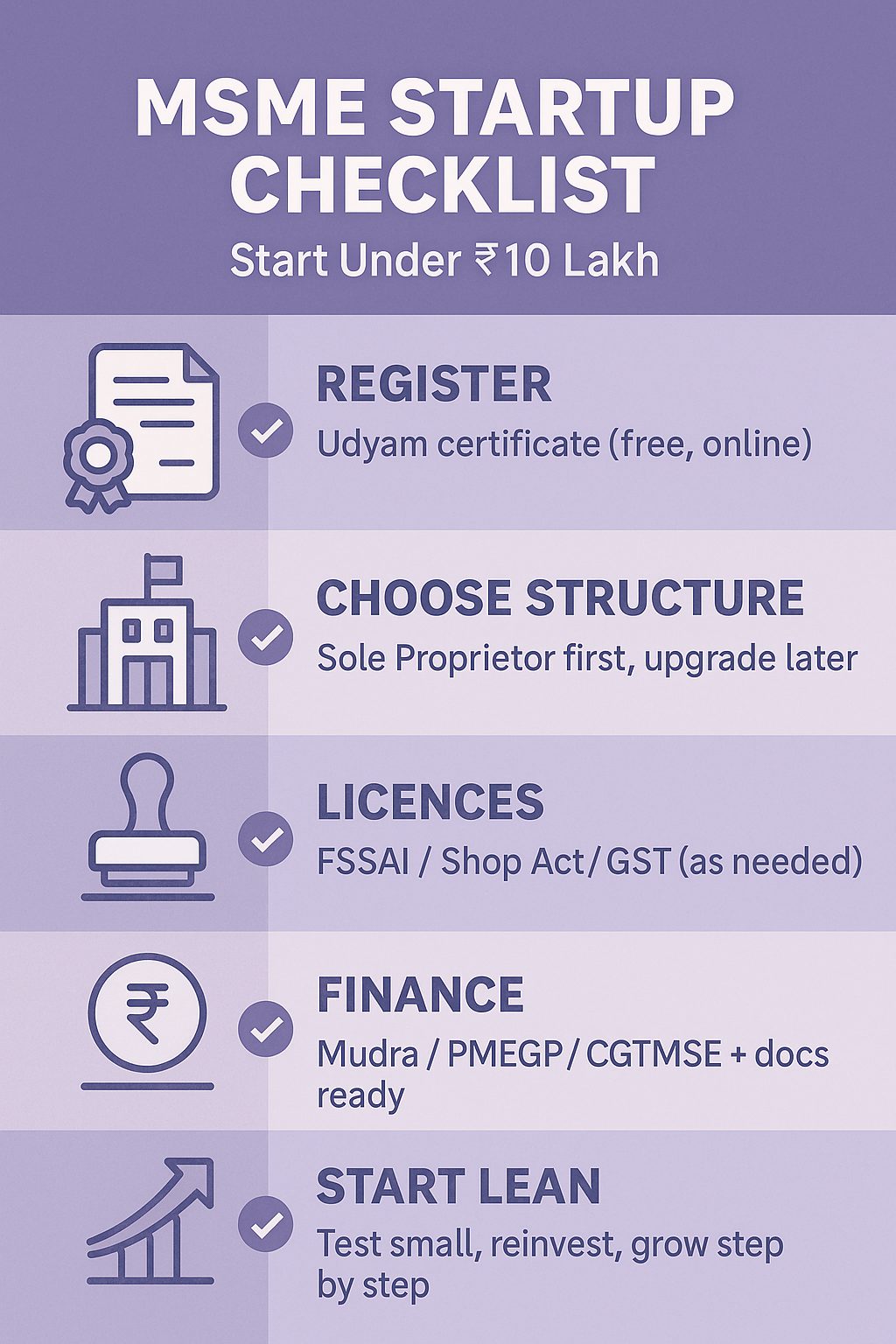



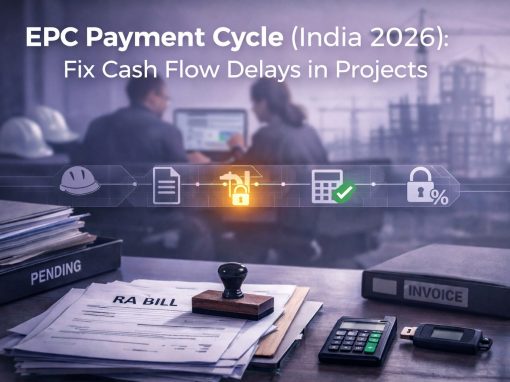

Nice of you for outlining the basic requirements for each of the potential business ideas. In addition, considering a business line that aligns with one’s skills and interests is bound to be more successful as you’ll be more motivated if you are passionate about it.
I’ve thought about opening a retail store, but online seems like the way to go with limited budget. The problem is, I’m not tech-savvy. Are there any of these ideas that are better for an in-person business, or resources to help me set up an online store easily?
Dropshipping is recommended for people who have good design skills and Marketing minds. i would recommend people to use their good 3 months time to learn both. there are many POD websites which are really helpful with either shopify or WOOCOMMERCE integration.
its good for people to start as sole service provider in Print on demand. but make sure you work on the Marketing specailly social media well
I have been working in marketing and design for the past 15 years. Please help me with how I can start this business.
Started a cloud kitchen two years ago with minimal equipment and now have loyal customers who order every week. The key is a solid social media presence.
Some of the most profitable franchise business ideas in India in 2025 include food and beverage, diagnostic centers, and eyewear.
Any research you have done Mr. Anand? we would love to see that to establish saying.
Good web site! I truly love how it is easy on my eyes and the data are well written. I am wondering how I could be notified whenever a new post has been made. I’ve subscribed to your RSS which must do the trick! Have a nice day